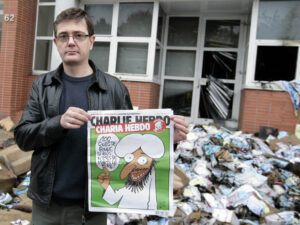By Jeremy Reynalds

The offices of French satirical weekly Charlie Hebdo were destroyed by a gas bomb, a day after it named the Prophet Mohammed as its “editor-in-chief” for this week’s issue.
According to an article by Henry Samuel for the Daily Telegraph, the fiercely anti-clerical magazine said the move, which included renaming the publication “Sharia Hebdo,” was intended to “celebrate” the victory of Islamist party Ennhada in Tunisia’s election.
The Telegraph said Charlie Hedbo’s editor-in-chief, known as Charb, told France Info radio, “We no longer have a newspaper. All our equipment has been destroyed or has melted.” No injuries have been reported.
A single Molotov cocktail was thrown at the offices of Charlie Hebdo in Paris’s 20th arrondissement at around 1am, the Telegraph reported. The ensuing fire was rapidly put out, but a large amount of material in the office was destroyed, police said.
“We cannot, today, put together a paper,” Charb said. “But we will do everything possible to do one next week. Whatever happens, we’ll do it. There is no question of giving in,” he said, adding that the magazine is filing a legal complaint against persons unknown.
According to Europe 1 radio, police are searching for two suspects seen near the scene.
The Telegraph said Charlie Hebdo’s website has also been hacked with a message in English and Turkish cursing the magazine.
The message said, “You keep abusing Islam’s almighty prophet with disgusting and disgraceful cartoons using excuses of freedom of speech. Be God’s curse upon you!”
The Telegraph reported editor Charb said the attackers could not even have read the offending magazine.
“The arsonists haven’t read this paper, nobody knows what’s in the paper except those who buy it this morning. People are reacting violently to a paper without knowing anything of its contents, that’s what’s most abhorrent and stupid,” he told BFM TV.
The Telegraph said the publication, historically famous for making fun of Catholic clericalism, was criticized by Muslims in 2007 after reprinting the Danish cartoons of the prophet Mohammad that caused outrage around the Islamic world.
Charb said the magazine had received “quite a few letters of protest, threats, insults” on Twitter and Facebook before the attack, but not as many as in 2007.
Ennahda won the most seats in Tunisia’s October elections and is now trying to form a coalition caretaker government. The Telegraph said it has promised to work with more liberal parties, and respect gender equality.
“To fittingly celebrate the victory of the Islamist Ennahda party in Tunisia. Charlie Hebdo has asked Mohammed to be the special editor-in-chief of its next issue,” the magazine said in a statement.
The Telegraph said the statement continued, “The prophet of Islam didn’t have to be asked twice and we thank him for it.”
The cover of this week’s issue shows Mohammed saying, “100 lashes if you don’t die of laughter.”
It also includes an editorial by the prophet entitled Halal Aperitif and a women’s supplement called Madam Sharia.
The Telegraph said behind the humor, the editorial’s message is serious, “No religion is compatible with democracy from the moment a political party representing it wants to take power in the name of God.”
The op-ed continued, “What would be the point of a religious party taking power if it didn’t apply its ideas? Hello, we are the Bolchevik party and if you vote for us we promise never to speak of Communism.Come on.”
French politicians and religious leaders were quick to condemn the attack.
Nathalie Kosciusko-Morizet, minister of economy, said, “Those who did this designate themselves as enemies of democracy. You don’t negotiate the freedom of the press with bombs.If you are not happy with what’s in a newspaper, you take it to court.”
Xavier Bertrand, the Labor minister, said he was “deeply shocked,” while Jean-François Copé, head of the ruling conservative UMP party said if the fire was linked to this week’s issue, “It serves as a reminder of what kind of acts can be committed by fundamentalists who manipulate religion for political ends.”
The Telegraph said Jean-Luc Melenchon, presidential candidate for the leftist Front de Gauche party called the attack “repulsive.” He called on the French “to have the intellectual discipline not to confuse a handful of imbeciles, numbskulls who will severely punished, I hope, with the vast majority of our Muslim compatriots who practice their faith perfectly calmly.”
“Blasphemy doesn’t exist as a crime, this is the French Republic; that’s the law (on freedom of the press),” he said.
The Telegraph said Mohammed Moussaoui, president of the French Council for the Muslim Faith (CFCM), said he “firmly condemned” the arson attack if it proved criminal.
The CFCM lost a court case against Charlie Hebdo in 2006 for re-printing Danish cartoons of the Prophet Mohammed, but denounced “the apology of violent Muslims.”
He said this issue was “not on the same level” of provocation, but added, “The very fact of caricaturing the Prophet is considered an offense to Muslims.”



